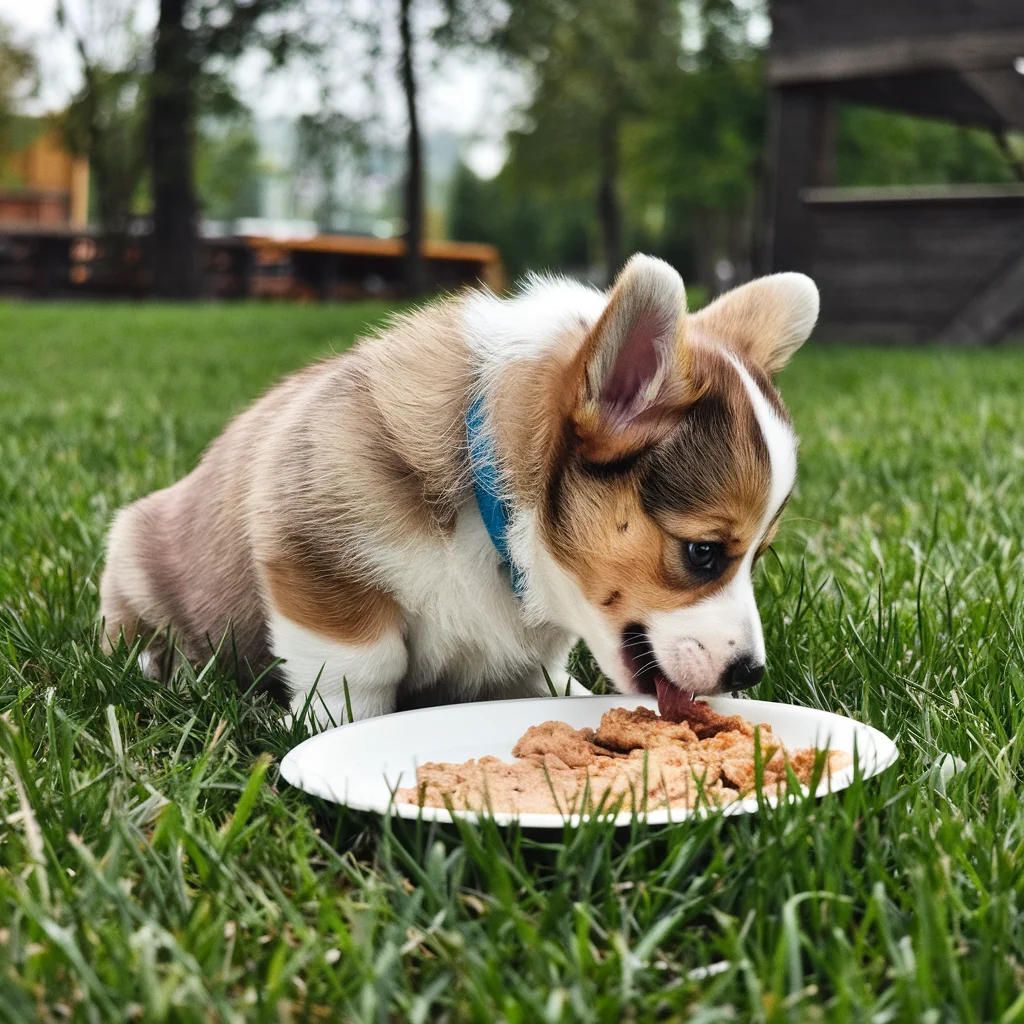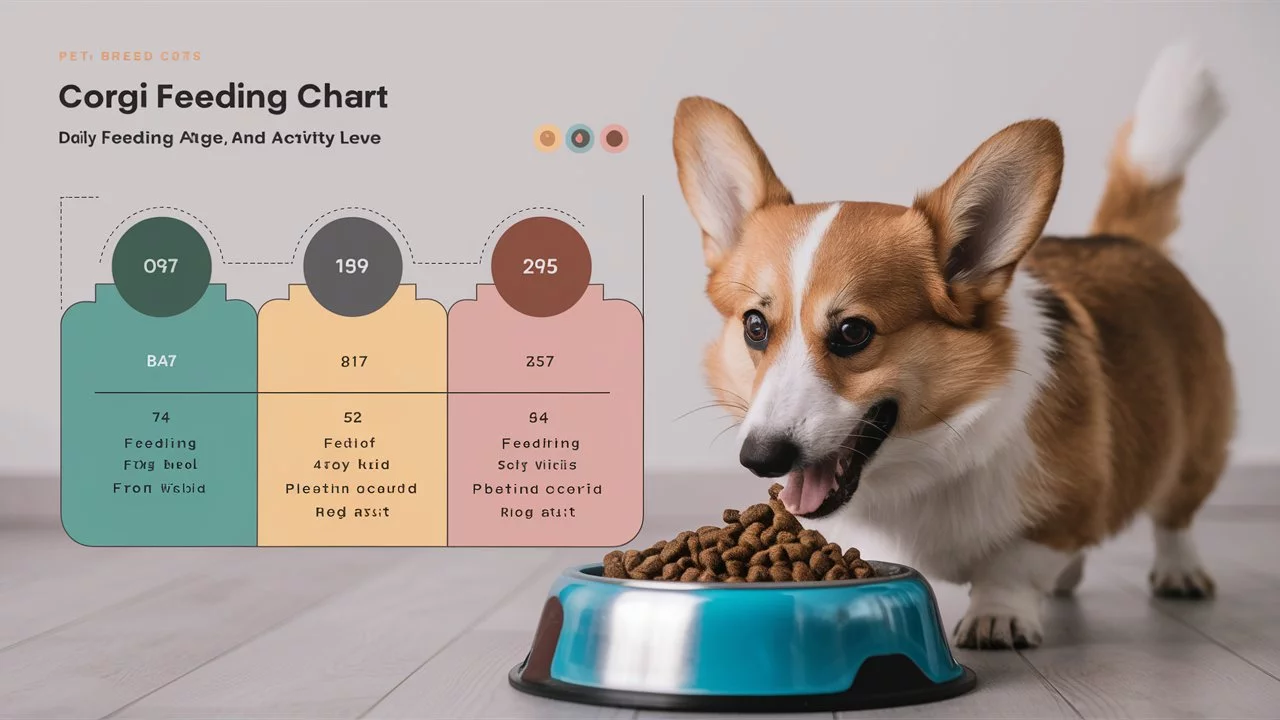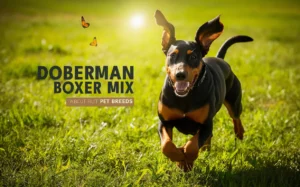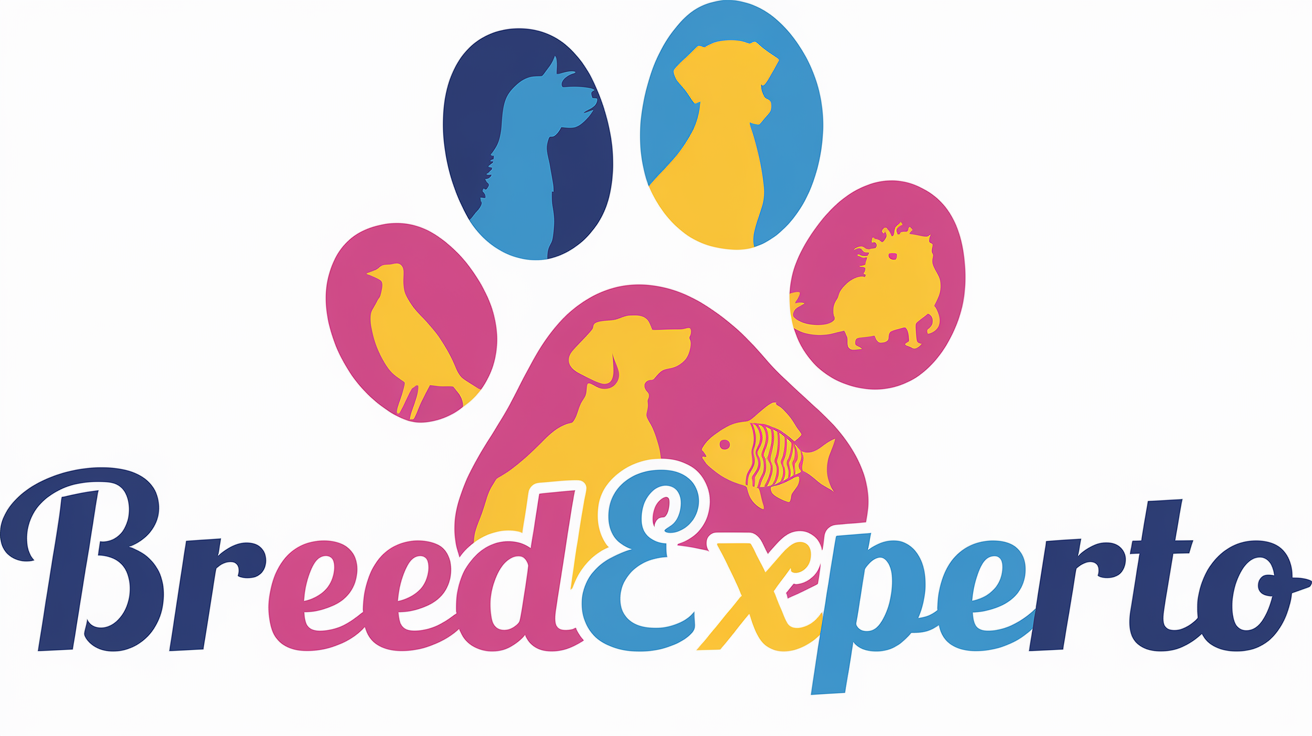Corgis are adorable, energetic, and loyal companions, known for their short legs and long bodies.
But behind that cuteness lies a crucial responsibility: ensuring they get the proper nutrition at each stage of life.
This guide will walk you through everything you need to know about feeding your Corgi, from puppyhood to their senior years, including a comprehensive Corgi feeding chart.
Understanding Corgi Feeding Needs

Corgis are a breed that tends to gain weight easily due to their compact build and love for food. That’s why their feeding needs vary significantly depending on their age, activity level, and health condition.
Corgi Feeding Chart Overview
A Corgi feeding chart is an essential tool that helps you determine the right portion size based on your dog’s age, weight, and activity level. Here’s a quick snapshot of the Corgi feeding chart:
| Age Range | Feeding Frequency | Portion Size Per Meal | Food Type |
| Birth to 4 weeks | Free feeding | N/A | Mother’s Milk |
| 4 to 10 weeks | 3-4 times daily | ½ to 1 cup | Puppy food (soft) |
| 3 to 6 months | 3 times daily | ¾ to 1 ½ cups | Puppy food |
| 6 to 10 months | 2-3 times daily | 1 to 2 cups | Puppy food (gradual adult) |
| 10 to 12 months | 2 times daily | 1 ½ to 2 ½ cups | Adult food |
| Adult (1-7 years) | 2 times daily | 2 to 3 cups | Adult food |
| Senior (7+ years) | 2 times daily | Adjust as needed | Senior formula food |
These are general guidelines that can be adjusted based on your Corgi’s individual needs.
The Best Diet For A Corgi: Key Considerations
Corgis require a balanced diet that’s high in protein, moderate in healthy fats, and low in carbohydrates. Here are the key elements of an ideal diet for a Corgi:
- Protein: Essential for muscle development, especially in a breed as active as Corgis. Look for high-quality protein sources like chicken, lamb, and fish.
- Healthy Fats: Omega-3 and Omega-6 fatty acids are essential for maintaining a shiny coat and healthy skin.
- Carbohydrates: While necessary for energy, Corgis should consume them in moderation. Avoid grain-heavy dog foods and opt for formulas with sweet potatoes or brown rice as healthier carb sources.
Wet vs. Dry Food:
Both wet and dry food have their advantages. Wet food can be more palatable and hydrating for your dog, while dry food is better for dental health. Many owners choose to mix the two for a balanced diet.
Portion Control:
Because Corgis are prone to obesity, portion control is critical. Always measure their food and avoid free-feeding adult dogs, as this can lead to overeating.
Corgi Puppy Feeding Chart
Puppies have specific nutritional needs that differ greatly from adult Corgis. Below is a breakdown of their feeding stages and dietary requirements.
Birth to 4 Weeks (Mother’s Milk)
In the first few weeks of life, Corgi puppies rely solely on their mother’s milk for nutrition. This provides them with antibodies, essential fats, and proteins necessary for early development.
4 to 10 Weeks (Weaning Process)
At around 4 weeks old, puppies start the weaning process. You can introduce soft puppy food by soaking it in water or puppy milk replacer to create a mash. During this time, the puppies still rely on their mother’s milk, but you can gradually reduce it as they adapt to solid food.
3 to 6 Months (Puppy Food Stage)
This is a rapid growth phase for Corgis. Feeding them a high-quality puppy formula 3 times a day is crucial. Ensure the food contains DHA (important for brain development) and adequate calcium for bone growth. At this stage, portions will range from ¾ to 1 ½ cups per meal.
6 to 10 Months (Growing Phase)
As your puppy grows, its food intake will need to increase to accommodate its energy needs. You can reduce feeding to 2-3 times per day. Portions will depend on your puppy’s size and weight but will typically be 1 to 2 cups per meal. Gradually introduce adult food to prepare them for the next stage.
10 to 12 Months (Nearing Adulthood)
At around 10 months, your Corgi will approach adulthood. You can now switch fully to adult dog food and feed them twice a day. Portions will range between 1 ½ to 2 ½ cups per meal, depending on their weight and activity level.
Corgi Feeding Chart For Adult Dogs (1 to 7 Years)

Adult Corgis have different caloric needs depending on their activity levels. Highly active Corgis will need more food than sedentary ones. Here’s a rough guideline:
- Portion Size: 2 to 3 cups per day, split into two meals.
- Food Type: Adult formula rich in protein (at least 25%) and healthy fats (10-15%).
- Activity Level: Adjust portion size if your Corgi is involved in agility training or other high-energy activities.
Corgi Feeding Chart For Senior Dogs (7+ Years)
As Corgis age, their metabolism slows, and they need fewer calories to maintain a healthy weight. It’s essential to adjust their food intake accordingly to prevent weight gain.
- Portion Size: Adjust to maintain ideal weight (typically 2 cups per day).
- Food Type: Senior dog food with added joint support, such as glucosamine and chondroitin.
- Nutritional Focus: Senior Corgis benefit from a higher fiber diet to aid digestion and reduce calories to prevent obesity.
Essential Nutrients In A Corgi Feeding Chart
Protein
Corgis need high-quality protein to maintain muscle mass and support growth. Look for foods with real meat as the first ingredient, such as chicken, turkey, or salmon. A minimum of 25% protein content is ideal.
Healthy Fats
Fats are essential for energy and skin health. Foods rich in Omega-3 and Omega-6 fatty acids (like fish oil and flaxseed) are great for maintaining a shiny coat. Ensure your Corgi gets about 10-15% fat in their diet.
Carbohydrates
While not as crucial as protein or fat, carbohydrates provide energy. Look for foods that use complex carbs like sweet potatoes or brown rice rather than cheap fillers like corn or wheat.
Vitamins and Minerals
A balanced diet includes essential vitamins and minerals like calcium (for bone strength), zinc, vitamin E, and B vitamins for overall health.
Supplements and Additives for Corgis
While a well-balanced diet should provide most of what your Corgi needs, there are times when supplements can be beneficial. Here are some common ones used for Corgis:
- Glucosamine and Chondroitin: For joint support, especially in older Corgis.
- Fish Oil: For coat and skin health.
- Probiotics: To promote gut health and better digestion.
Always consult your vet before adding any supplements to your dog’s diet to ensure it’s necessary and safe.
Why Is My Corgi Always Hungry?
Corgis are notorious for their love of food, but sometimes their hunger can signal other issues. Common reasons include:
- High Metabolism: Some Corgis burn calories faster, making them hungrier.
- Poor Nutrient Absorption: If your dog isn’t absorbing enough nutrients from their food, they may always feel hungry.
- Behavioral Issues: Some Corgis eat out of boredom or stress. Try feeding them using puzzle feeders to slow down mealtime.
- Health Conditions: Diseases like hypothyroidism and diabetes can cause excessive hunger. If your Corgi’s appetite seems abnormal, consult your vet.
Common Feeding Mistakes To Avoid
Overfeeding
One of the most common mistakes is overfeeding. Corgis are prone to weight gain, which can lead to health problems like joint issues and diabetes. Stick to recommended portion sizes and adjust as needed based on weight and activity.
Feeding Human Food
While it’s tempting to give your dog table scraps, many human foods are harmful to dogs. Avoid giving your Corgi foods like chocolate, grapes, onions, and garlic.
Not Adjusting Diet With Age
As your Corgi transitions from puppyhood to adulthood and eventually into their senior years, it’s crucial to adjust their diet to meet their changing needs.
Frequently Asked Questions About Corgi Feeding
How much should a Corgi eat daily?
An adult Corgi should eat between 2 to 3 cups of food per day, depending on their weight and activity level.
Can I feed my Corgi raw food?
Yes, raw diets can work for Corgis, but they require careful planning to ensure they meet all nutritional needs. Consult your vet before starting a raw diet.
What foods should I avoid giving my Corgi?
Avoid foods like chocolate, grapes, raisins, onions, garlic, and anything high in fat or sugar. These can be toxic or harmful to dogs.
Conclusion
Feeding your Corgi a well-balanced diet is essential for maintaining their overall health and longevity. Using a Corgi feeding chart tailored to their age and activity level will help you provide the proper nutrition they need at each stage of life.
Always choose high-quality, nutrient-rich food, monitor their weight, and adjust portions as needed to prevent overfeeding. With the right diet, your Corgi will stay happy, healthy, and full of energy for years to come.












